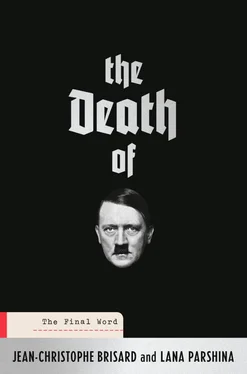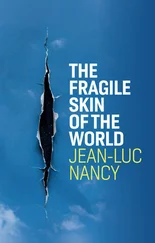“You’ll have to ask her,” our informant said, still on the defensive. “Here she is now, you can ask her directly.” The head of the special collection, our new friend Dina, was about to finish a day that had started so early that she was exhausted already. While the elderly archivist closed a thick armoured door–one of the many doors leading to the shelves of the archives–Lana put into practice her theory of the “human factor.” A failure. Dina resisted. What did we want from her now? She didn’t have time. She didn’t want to. Lana lost her footing; she couldn’t find the slightest angle, the slightest foothold to cling to. What about vanity? That might work. “Isn’t it strange that you’re never mentioned in all those articles about Hitler’s skull?” I asked Lana to translate word for word. She was acquitting herself to perfection. I continued without letting Dina reply: “We’ve just been told that the skull was rediscovered thanks to you! Your discovery is historical, ground-breaking. The public needs to know.” “Da, da.” Dina replied with several “da’s.” She was coming round. The corridor in which we were talking was tiny and narrow. It connected three doors and a lift. The opposite of the ideal place to receive a confession. “A tea; would you like to come and join us for tea, in a tea room or a restaurant? It would be quieter and easier to talk.” A rookie’s tactlessness, a misunderstanding of Russian culture, Lana would tell me later, explaining my mistake. A man can’t invite a woman for a drink, even if she’s as old as his grandmother. A meeting in her office, yes, that was possible. Tomorrow? “Why not, tomorrow. If you like. But I don’t think it will be terribly interesting,” Dina simpered like a schoolgirl.
If the level of seniority of a state employee must be judged by the size of her office, then Dina could lay claim to the post of “toilet lady.” It was far from that of the head of the special collection of the big State Archives of the Russian Federation. What mistake could this woman have committed, to find herself in such a small and uncomfortable room? Low-ceilinged, with a window so narrow that a child would have had trouble getting its head through it, her office was so small that if more than three people had been in there they would hardly have been able to breathe. It was accessed directly by the stairs, which, on the other floors, normally lead to the toilets. Hence “toilet lady.” A thick silvery mane about ten centimetres long rocks back and forth above a formica table in front of us. Dina is sitting working in semi-darkness. Our arrival doesn’t disturb her activity. Her baroque hairdo resists the laws of gravity and remains powerfully attached to her skull. No stray strand comes away from the capillary mass. Is it a wig? Without even looking up, Dina addresses Lana. She reminds her how precious her time is. In return we assure her that we are perfectly aware of that, and we apologise for interrupting her very important work… Lana is never one to hold back. Dina listens to her not without displeasure [is this what is meant?] and then decides to look at us. “I’d forgotten about our meeting. As I told you yesterday, I don’t know if I can help you, and I still have lots of documents to file.” The transformation is striking. Moving. Dina is dressed up as if for a dance. Colour on her cheeks and on her lips. Pink, unless it’s mauve; at any rate, it’s very much apparent. No, Dina hasn’t forgotten about us. She was waiting for us. For the first time in ages, Lana and I relax. The conversation should go well.
The Viet Cong had won after two decades of war. In that year, 1975, the Communist doctrine triumphed and spread over all the continents. The Soviet Union carried more weight in the world than ever before, and treated the United States as an equal. In Moscow, food shortages had been a thing of the past for a long time, and political purges had become less frequent. The future for the Soviets seemed radiant at last. Leonid Brezhnev had been in charge of the country for eleven years. He had the jowly face of an apparatchik ; not brilliant, perhaps, but less terrifying than Stalin. It was in this almost peaceful Soviet Union that Dina Nikolaevna Nokhotovich, at the age of thirty-five, saw her life collapsing from one day to the next. GARF has ceased to exist. The whole of the state administration (a perfect pleonasm, since in the Soviet Union the private sector didn’t exist) was identified in Soviet-compatible terms. The administration for which Dina worked didn’t escape this process, and was soberly entitled “Central State Archives of the October Revolution and the Edification of Socialism.” That was forty-one years ago. In a different era, in a different country, under a different regime.
Dina can’t help pursing her lips between each of her phrases. Her eyes are staring at an imaginary point that removes her from the present moment, from her tiny office at GARF and this neo-capitalist twenty-first-century Moscow. For a long time she says nothing. Then her story begins. “I had just been put in charge of the ‘secret’ department of the archives. That was in 1975. The post was like no other, because it dealt with the confidential documents of the history of our country, the Soviet Union. At that time, the state worked perfectly, and we weren’t short of qualified staff. Custom decreed that my predecessor came to give me the basic information, the information that was supposed to allow me to accomplish my mission as well as possible. Strangely, that never happened.” The former head of the secret department had simply disappeared. Gone, flown away, not a trace. As if he had never existed. And today, Dina can’t remember his name. What happened to him? A sudden transfer to another administration? An accident? A serious illness? Dina never knew and never asked. A Stalinist habit–some people might call it the survival instinct–reigned in this people’s “paradise.” In the Soviet Union, those who disappeared could hope for no help from those who stayed behind. Their memory was erased from the collective memory. In the mid-1970s, Dina didn’t feel like playing at being the heroine; her predecessor was nowhere to be found. Too bad. She would get by without him.
“I was impatient to discover what kinds of documents I was responsible for. I remember, when I went into my new office, I found several safes. Security gave me the keys and I was able to open them.” Even today, these huge safes, tall as sideboards, wide as fridges, stand in most of the rooms in GARF. What do they hide? All of our questions went unanswered. Perhaps they’re just empty. They would be too heavy to move. In 1975, Dina’s safes were really used. “There were documents inside, but also objects. The most surprising thing is that none of those objects had been inventoried. No code, no register, no classification. They quite simply didn’t exist.” A lot of people, in those days, would simply have put everything back in the safe and been particularly careful to forget their existence. Not Dina. “I was curious to know, I wasn’t afraid. Why would I have been afraid? I wasn’t doing anything forbidden. I asked a colleague to join me, and we both started going through this treasure trove. There were objects wrapped in cloth. Some were bigger than others. When I opened the smallest one, I’d have to say that we were quite frightened. It was a piece of human skull.”
The story is interrupted by a strange metallic click. The sound comes closer to Dina’s office. It’s Nikolai. He comes in, pushing a supermarket trolley. The same pale Nikolai Vladimirsev who had been so horrified about the manhandling of the skull. Now we just need the director of GARF and we’d have the full team. Dina isn’t surprised. She gets up and asks us to follow her. The rest of the conversation will take place in the room where we were able to study the skull six months before, on the ground floor of the building. Without taking the trouble to reply to our greetings, or even to apologise for interrupting our discussion, Nikolai follows us with his ridiculous little trolley. The clatter of the wheels on the tiles echoes down the sleepy corridors like some infernal machine. Reaching the room with the rectangular table, Dina takes a seat and asks us to do the same. Nikolai parks his trolley in a corner and takes out some battered files and a thick cotton sheet. The scene is played out in silence. Dina guides her colleague with a wave of the hand and shows him where to set it all down. Files at the end of the table, the worn sheet just in front of us. “There… Everything that I’ve found is here.” Just as Dina says this, her colleague unfolds the sheet with a wide and graceful gesture to reveal… some table legs. “Step forward. You’re allowed to do that.” Nikolai has regained the gift of speech, and seems almost chatty. “Here’s the other proof of Adolf Hitler’s certain death: traces of blood on the legs of his sofa.”
Читать дальше












